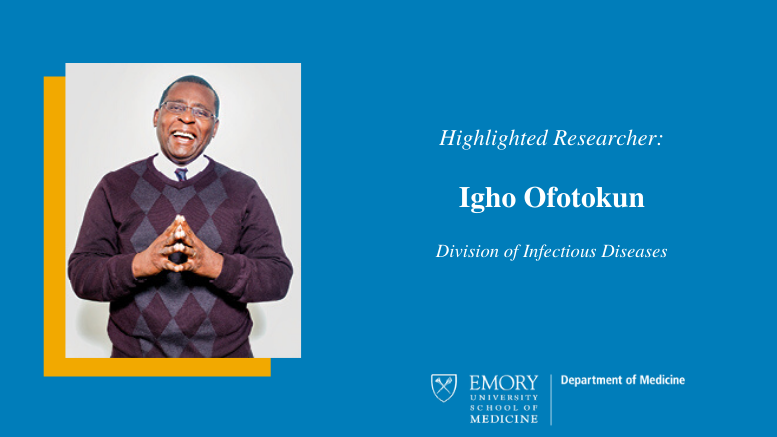What is your professional background?
I obtained my undergraduate and medical degrees from the University of Ibadan and the University of Benin, Benin City, Nigeria, respectively. I completed both my residency in internal medicine and my infectious diseases fellowship at the University of Michigan Medical Center, Ann Arbor. Upon completion of my training in 2001, I joined the faculty at the University of Kentucky (UK) where I started my research career and was a recipient of the NIH Building Interdisciplinary Research Careers in Women’s Health (BIRCWH) award. After two years at UK, I relocated to Emory University for its robust HIV clinical and translational research opportunities. During the early period of my career at Emory, I completed the CTSA sponsored MSCR degree program to enhance my clinical research skills. I was also awarded the NIH/NIAID K-23. Building upon these career development opportunities and the rich environment at Emory, I transitioned into independence, maintaining consistent extramural support from the NIH for my clinical and translational research work through the years. My career as a clinician-scientist has therefore been centered on providing care for persons living with HIV, particularly affected women, HIV clinical and translational research, research education, and mentoring the next generation of researchers.
In what division do you work, and who is your mentor?
I was attracted to Emory University in 2003 by the work of Drs. Jeffrey Lennox and Carlos del Rio (both of whom have served as my mentors) and the robust HIV clinical and translational research opportunities at the Grady Infectious Diseases Program (IDP). I am a card-carrying faculty member of the Division of Infectious Diseases.
Briefly describe your research. Why is it important?
My research team studies Non-AIDS age-related comorbidities with a particular focus on how HIV and antiretroviral drug mediated disruption of the immuno-skeletal interphase alter bone homeostasis and induce fragility bone disease. We are also interested in sex differences in the outcomes of chronic infectious diseases. The overarching goal of my work is to understand the pathogenesis of HIV induced end-organ damage with the hope of identifying targets that can be manipulated for prevention or treatment. I am the contact PI of the NHLBI funded MACS/WIHS Combined Cohort Study aimed at studying age-related comorbidities and sex differences among individuals aging with HIV/AIDS. I am also the contact PI of the NIH-funded Emory Specialized Center of Research Excellence on Sex Differences (SCORE) that is exploring the role of sex hormone status on HIV host-pathogen interaction.
What do you like most about Emory?
Emory is one of the most collaborative places I have worked. The leadership and Emory community has created an environment that is very conducive for team science and collaborative work.
What is your favorite movie or TV show?
I enjoy The Sound of Music.
What do you like to do in your spare time?
I like to walk and to run, and, sometimes, I cook Nigerian dishes for my family.


Be the first to comment on "Highlighted Researcher: Igho Ofotokun"